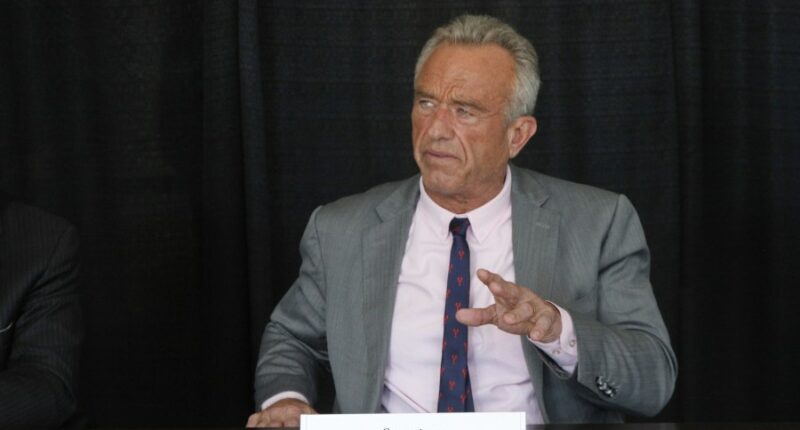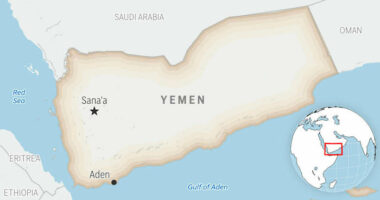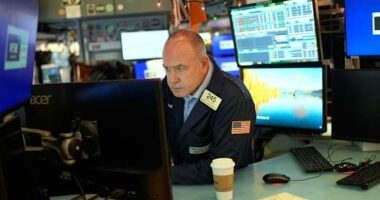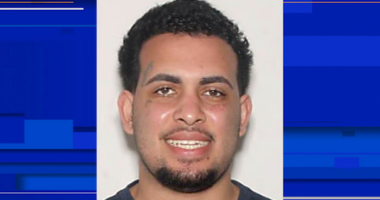Share this @internewscast.com

WASHINGTON (AP) — The Department of Health and Human Services is set to terminate contracts and withdraw funding for certain vaccines that are being developed to combat respiratory viruses such as COVID-19 and the flu.
Robert F. Kennedy Jr. declared on Tuesday that 22 initiatives, amounting to $500 million, focused on developing vaccines through mRNA technology will be halted.
Kennedy’s move to end these projects is the latest step reflecting the vaccine skeptic’s views on vaccinations at the nation’s health agency. He has retracted guidance related to COVID-19 shots, dismissed the committee responsible for recommending vaccines, and avoided giving strong support for vaccinations even as a measles outbreak worsened.
The health secretary criticized mRNA vaccines in a video posted on his social media channels, outlining the rationale for discontinuing projects led by major pharmaceutical companies, including Pfizer and Moderna, which provide protection against viruses like the flu, COVID-19, and H5N1.
“To replace the problematic mRNA programs, we’re focusing on the development of safer, more comprehensive vaccine strategies, such as whole-virus vaccines and new platforms that don’t falter when viruses mutate,” Kennedy stated in the video.
Experts in infectious diseases assert that the mRNA technology used in vaccines is safe, and they attribute its creation during the first Trump administration with mitigating the impact of the 2020 coronavirus pandemic. They cautioned that upcoming pandemics will be more challenging to manage without mRNA assistance.
“I don’t think I’ve seen a more dangerous decision in public health in my 50 years in the business,” said Mike Osterholm, a University of Minnesota expert on infectious diseases and pandemic preparations.
He noted mRNA technology offers potential advantages of rapid production, crucial in the event of a new pandemic that requires a new vaccine.
The shelving of the mRNA projects is short-sighted as concerns about a bird flu pandemic continue to loom, said Dr. Paul Offit, a vaccine expert at Children’s Hospital of Philadelphia.
“It’s certainly saved millions of lives,” Offit said of the existing mRNA vaccines.
Scientists are using mRNA for more than infectious disease vaccines, with researchers around the world exploring its use for cancer immunotherapies. At the White House earlier this year, billionaire tech entrepreneur Larry Ellison praised mRNA for its potential to treat cancer.
Traditionally, vaccines have required growing pieces of viruses, often in chicken eggs or giant vats of cells, then purifying that material. The mRNA approach starts with a snippet of genetic code that carries instructions for making proteins. Scientists pick the protein to target, inject that blueprint and the body makes just enough to trigger immune protection — producing its own vaccine dose.
In a statement Tuesday, HHS said “other uses of mRNA technology within the department are not impacted by this announcement.”
The mRNA technology is used in approved COVID-19 and RSV shots, but has not yet been approved for a flu shot. Moderna, which was studying a combination COVID-19 and flu mRNA shot, had said it believed mRNA could speed up production of flu shots compared with traditional vaccines.
The abandoned mRNA projects signal a “shift in vaccine development priorities,” the health department said in its statement, adding that it will start “investing in better solutions.”
“Let me be absolutely clear, HHS supports safe, effective vaccines for every American who wants them,” Kennedy said in the statement.
Speaking hours later Tuesday at a news conference in Anchorage, Alaska, alongside the state’s two Republican U.S. senators, Kennedy said work is underway on an alternative.
He said a “universal vaccine” that mimics “natural immunity” is the administration’s focus.
“It could be effective — we believe it’s going to be effective — against not only coronaviruses, but also flu,” he said.
—
Associated Press writers Lauran Neergaard in Washington, Mike Stobbe in New York and Becky Bohrer in Juneau contributed.













